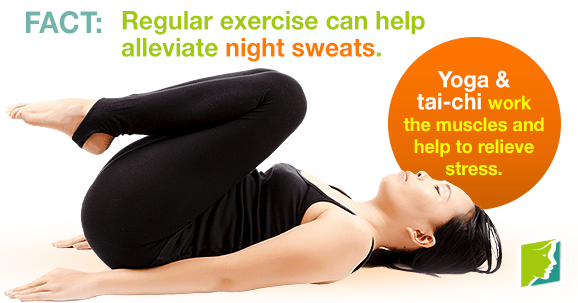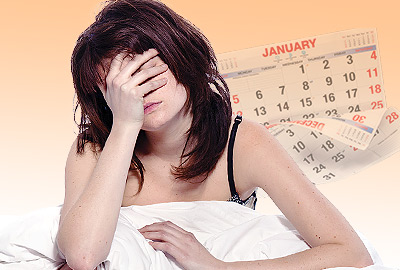Night sweats often plague women approaching menopause, when hormonal activity increases internal temperature and the body sweats in attempts to cool down. Awakening during the night to find yourself coated with clammy, odorous sweat is never pleasant, and constant interruptions to sleep can ultimately lead to fatigue. It's important to combat the symptom, but there are debates about the most effective way to do this, especially when it comes to exercise and night sweats. Does exercise help or worsen sweating episodes? Keep reading to discover the truth behind exercise and night sweats.
MYTH: Working out makes me sweat so surely exercise makes night sweats worse.
FACT: Regular exercise can alleviate night sweats.
Exercise may seem like a contributor to night sweats because in the short-term it triggers immediate sweating. However, exercising five days a week for roughly half an hour ultimately strengthens the body and improves fitness, which stands the body in better stead to combat disorders and conditions in the long-term, including night sweats.
MYTH: Exercise raises internal body temperature.
FACT: Exercise raises internal body temperature, so avoid it in the evenings.
When you exercise, the speed at which your body converts glucose to energy (i.e., metabolic rate) increases. This generates internal heat, resulting in an increase in body temperature. The hypothalamus gland, which controls body temperature, responds to this by prompting the body to respond to the temperature change to cool down, by flushing and producing sweat. This effect can continue for up to three hours after exertion, which is why it's a good idea to avoid exercising in the evening; work out in the morning or afternoon, instead.
It's also important to moderate your internal temperature during and after exercise by staying hydrated. Sipping water 20 minutes before working out and then continually during your exercise session will help counter any increase in body temperature to reduce the severity of post-exercise sweating, and replace any fluids lost via the sweat glands throughout the session.
MYTH: Certain exercises are better for relieving night sweats.
FACT: Certain types of exercise promote deeper, more restful sleep.
Any type of cardiovascular exercise, such as running, swimming, or cycling, will help alleviate night sweats to some extent. However, anxiety and stress are common causes of sweating episodes, so exercises that provide stress-relief could offer extra benefits for alleviating night sweats associated with anxiety. Yoga and tai chi work the muscles but also have a calming effect which could limit the occurrence of stress-related sweating. These may also promote restful sleep and thereby lessen the likelihood of nocturnal sweating resulting in fatigue.
Like many malfunctions and disruptions in the body, night sweating can be at least slightly alleviated through physical activity, provided it's done responsibly. Participate in regular, daytime exercise and night sweats will markedly improve; work out intensely in the evening, and you'll probably notice your sweating become more intense. Exercise is vital for healthy bones, muscles, and tissues, and night sweats are no reason to stop working out.
Sources
- NCBI (1990) Fever, Chills, and Night Sweats. Retrieved: 24th June 2014 from http://www.ncbi.nlm.nih.gov/books/NBK324/
- MedlinePlus (29th May 2011) Sweating. Retrieved: 24th June 2014 from http://www.nlm.nih.gov/medlineplus/ency/article/003218.htm
- NHS (18th October 2011) Night Sweats. Retrieved: 24th June 2014 from http://www.nhs.uk/conditions/night-sweats/Pages/Introduction.aspx
- Stanford Edu (6th November 1998) Sleep hyperhidrosis. Retrieved: 24th June 2014 from http://www.stanford.edu/~dement/sweats.html




